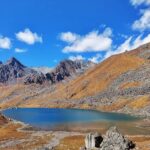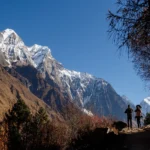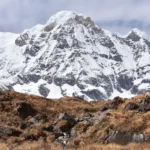Outdoor cooking in the wilderness can be adventurous and has its share of challenges. Sometimes the campsite you are camping in can be windy to indulge in any cooking activities. Cooking outdoors, if done properly can be gratifying. Imagine the sense of pride you feel when you cook a hot meal thousands of meters above sea level.
We all know the importance of a balanced diet to keep our bodies warm and our systems functioning properly. Ingesting a balanced meal ensures you are taking enough nutrients to balance your daily energy expenditure.
Your body consumes energy to carry out daily metabolic activities and muscular workouts.
Now, suppose you are on a trek and your daily energy expenditure is 4000 Kcal. For maintaining a similar body structure, you will have to consume at least 4000 Kcal of energy. Depending upon if you want to lose or gain weight, you will have to intake <4000Kcal or >4000 Kcal respectively.
Calculating and ingesting a balanced diet is simple, it is learning to cook outdoors which is the tough part. It requires one to learn outdoor cooking techniques and the ability to cook with minimal resources.
In this blog, we will discuss the four important things to keep in mind while cooking outdoors :
- Basic Preparation
- Basic Hygiene
- Basic Cooking
- Basic Safety
1. Basic Preparation –
- Place the ingredients, utensils, and cooking equipment you need within reach before lighting up your stove.
- Determining proportions, amount of water, and cooking time as per serving is the most critical part of the cooking process. If you have any doubts, ask for help from your outdoor instructor.
- Cheese, milk and other dairy items enhance taste, and texture, and add calorific value to a meal. These should always be kept under shade, as they go bad when left in the sunlight.
- Run the recipe in your head and discuss it with the person helping you prepare the meal.
- Spicing is personal, and respecting others’ tastes when flavouring a meal is important.
- Clean up personal and cooking utensils as soon as the meal ends.
2. Basic Hygiene –
- Wash your hands before handling food.
- Dairy items like cheese, butter, and milk should never be touched with bare hands.
- Don’t share your personal utensils and never let them come in contact with the food items in the kitchen.
- Utensils should be washed and sterilized with boiling water routinely.
- Clean pots and dishes after every cook to avoid foodborne illness.
- Scrub the pot with hot water and natural abrasives like sand or ash.
- Throw water used for washing away from camp in a scattered fashion, and don’t drench any spot.
- Separate organic and dry waste. Bring down dry waste to the base camp and put the organic waste in a compost pit near the camp.
- Let clean pots dry in the sunlight.
3. Basic Cooking –
- When preparing a meal, watch out for small bubbles called ‘fisheye’ rising in the water. When seen, water is ready to use at boiling point.
- Since atmospheric pressure is low at high altitudes, water will boil at a lower temperature, and vegetables and starch will take longer to cook.
- Use a pressure cooker to compensate for the low atmospheric pressure.
- Keep a low flame to start with.
- Make sure there is enough water inside the cooking utensil to avoid burning/sticking the food items on the cooking utensils.
- Milk products should go in last, once you are done cooking everything else.
- Coffee, milk or cocoa, or any kind of powder should be mixed separately with liquid to avoid lump formation when you put it to boil.
- Frying of onions and basic masala – ‘tadka’ should be cooked quickly on high flame and keep adding hot water to avoid burning.
4. Basic Safety –
- Knife cuts are a common camp injury. Ask your experienced and confident team member to take up the chopping task.
- Be aware of hot handles while handling and serving the food. Once the meal is cooked, let your pot cool down for some time and check before lifting it up.
- Use a cloth or an extra hand when you don’t feel confident while cooking, handling, and serving.
- No more than 2 members should be involved in the cooking process.
- Be careful when handling the stove. Refer to the stove handling and safety in case of any doubt.
- Keep children out of the cooking area to avoid any unforeseen injury.
These basics will help you in developing outdoor skills to prepare healthy and nutritional meals outdoors.
At OWLS, we help you in understanding the importance of outdoor skills and develop them. These skills make you confident and make you realize your potential when staying outdoors. They keep you ready for different situations and make you think about the circumstances before taking any action.
Hope this was an informative and helpful guide to preparing an outdoor meal in the wilderness. Follow our Blog for more information on how to excel at staying in the outdoors and practices that professionals follow.





